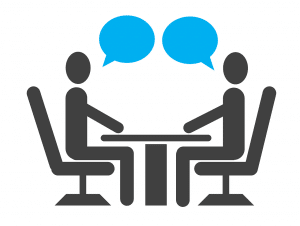Hey – are you okay? It’s a question all of us get asked a lot, probably almost as much as “How are you?” And both of these little, innocent questions can seem much bigger if you’re going through something that’s making you feel “not okay.” So this Mental Health Awareness Month, we want to talk about the questions that are meant to be caring and/or simply polite, but can end up being endlessly awkward. So, if you’re not actually “okay,” how can you respond to these questions in ways that either:
- Don’t open up wounds that you aren’t prepared to discuss with that particular person OR
- Convey that you aren’t, in fact, okay, and begin an open discussion about what’s going on and what you need?
It’s OK to Not Be OK
First things first: we want to be really clear that it’s always okay to not be okay. We have all been through a lot the last few years, with fear, loneliness, and uncertainty creeping into the lives of even people who considered their mental states solid as a rock before 2020.
But it doesn’t have to be the recent pandemic, or even any major life event, that has you feeling anxious and/or depressed. Both of these are incredibly common issues that affect millions of people, so you are certainly not alone. In fact, anxiety disorders are the most common mental illness in the U.S., affecting 40 million adults in the United States age 18 and older, or 18.1% of the population, every year. Major depressive disorder (MDD) affects more than 16.1 million American adults, or about 6.7% of the U.S. population age 18 and older, in a given year, and persistent depressive disorder (PDD) affects approximately 1.5% of the U.S. population age 18 and older in a given year. And those are just some of the mental health concerns that affect people every day, and that can be made worse by difficult patches in life.
So yes, it’s okay to not be okay, but it is important to get help if you’re struggling. It takes courage to share that you aren’t okay, and that you need help, but insisting that everything is fine when it isn’t will only make things worse. So talk to a trusted professional, someone who you feel safe opening up to.
But if you are going through a time in your life when you’re struggling, it might be the smaller everyday interactions, the ones that seem less consequential, that might begin to feel difficult. So let’s look at how you can navigate those situations.
Steps for Dealing with THE QUESTION
If you know you’re going to have difficulty answering the questions “Are you okay?” or “How are you?” with some polite small talk, think about the following strategies:
1. Think about who you want to have this conversation with
Just as it’s always okay to not be okay, it’s also okay to not want to discuss your mental state with everyone who inquires, no matter how well-intentioned they might be. In fact, if you are going through a very difficult time, it can make things feel even more emotionally draining, or prolong a grieving process, if you’re constantly being asked “Are you okay?”
Some of the people asking you this are curious (and they can be politely assured that you will be fine if you’re not ready to satisfy their curiosity), and others need to reassure themselves that they are doing their part to “be there for you.” You can be honest with them that you are indeed going through a difficult time, but it’s okay for you to talk about other things for now.
But there are other people who you can open to when they ask about your mental state, people in your life who have the right skills to provide emotional support, and an empathetic ear. These people don’t even have to be in your immediate family or your closest circle of friends, but if they’re ready to offer their optimism and empathy, or constructive ideas if that’s what you need, they might just be the right person to lean on.
2. Consider the intentions of the person asking

Similarly to thinking ahead of time about who you want to open up to, when confronted with the actual questions “Are you okay,” “How are you,” etc, it’s okay to take a beat and consider the intentions behind the question. First of all, who’s asking? Are they someone you are close to, someone you believe truly cares about you? Or are they a more casual acquaintance who’s just asking the question in a polite, automatic way?
If you determine that this is not someone who you would trust with your intimate secrets, or even if you just don’t feel comfortable opening up, it’s okay to simply be polite and indicate with your answer that you’re not really up for talking about things on a deeper level. Try responding with something like:
- I’m hanging in there, thank you so much for asking. How about you?
- Ugh, we’re all going through tough times, right? How about we talk about some good stuff?
- Life is tough, but so are we, right? What’s going on with you?
- (If they still persist) You know, I’m just processing some stuff right now, and I’m not really ready to talk about it, but I appreciate your concern.
On the other hand, if the person asking is really asking, and they are someone with whom you’re willing to share your emotions, don’t be afraid to reach out. You can simply say, “Actually, it’s been a really tough week. Would you be up for talking about it with me?” You might find that you can be relieved of some of your heavy burden, if only for the time that it takes to get coffee together. Or you might even come away with some new ideas and a new outlook on how to get further support.
3. Think about how answering will affect you
As we’ve said, these little questions can really take their toll, for a variety of reasons. Being asked them can feel like a reopening of wounds, or being asked them might make you feel like it’s just so obvious that you’re not okay. You might even worry that opening up will be a burden on the people asking. So step back, take a breath. Remember, you don’t have to answer everyone with a bearing of your soul, and those who you do want to open up to are your support system, and are asking you out of genuine concern.
But what about the people in between? Those asking out of concern, and with whom you want to open up to to a certain extent, but who you might not always want to tell all the details? There’s a way to find a balance.
4. Set boundaries
How do you find that balance? Remember that it’s great to have multiple people you can open up to when you feel you need to, but that you won’t always want to open up fully to everyone all the time – and there are ways you can express that to these people in your life. For example, if you start feeling like a friend that you’ve opened up to is now constantly walking on eggshells, asking you “Are you okay? How are you?” in a certain way, you can tell them that not every conversation you have has to be so heavy. Let them know how much you appreciate them being there for you, and you will take them up on their offer of support when you need it, but for now it’s totally okay for you to talk about all the little things you’ve always talked about as friends!
And on the subject of setting boundaries, remember also that you can set boundaries in the conversations that you choose to have. For example, if the person you’re talking to tries to hijack the conversation and steer it towards their solutions or wants to make it all about “fixing” your problem, and you’re not ready for that, it’s okay to tell them that right now you just want to vent. Kindly tell them that you appreciate them wanting to help, but really all you need/are ready for right now is someone to listen – and maybe further down the road you might want to discuss how to move forward.
5. Don’t take unhelpful responses personally – and find someone that IS helpful
So maybe you’ve chosen not to answer that “Are you okay?” or “How are you?” with polite chit chat, and you’ve told the truth – you’re not okay. And the person asking is completely unhelpful, uncomfortable, or brushes you off – that can feel devastating. But remember that their response is no reflection on your needs. They are still valid, it’s just that that person was perhaps not in the right place to respond to your needs, or maybe has something going on in their own life. Don’t let their response shut you down; it’s important to let someone else know you’re not okay, and continue to look for the help you need until you get it.
There’s no question about it: life can be tough. But so are you! That doesn’t mean, though, that you need to go it alone. If you’re “not okay,” please don’t hesitate to reach out to someone you trust and take the first step in the process of healing.





